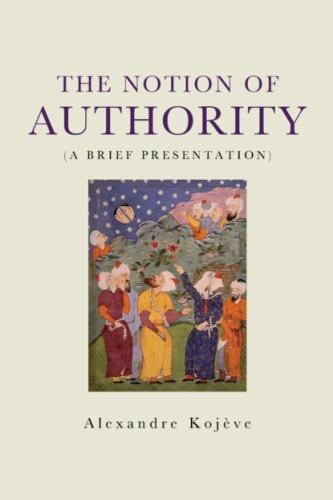The Notion of Authority
The Notion of Authority
(A Brief Presentation)
ALEXANDRE KOJÈVE
Edited and introduced by François TerréTranslated by Hager Weslati
This English-language edition first published by Verso 2014
Translation © Hager Weslati 2014
First published as La notion de l’autorité
© Éditions Gallimard 2004
All rights reserved
The moral rights of the author have been asserted
1 3 5 7 9 10 8 6 4 2
Verso
UK: 6 Meard Street, London W1F 0EG
US: 20 Jay Street, Suite 1010, Brooklyn, NY 11201
Verso is the imprint of New Left Books
ISBN-13: 978-1-78168-095-7 (HBK)
eISBN-13: 978-1-78168-630-0 (US)
eISBN-13: 978-1-78168-631-7 (UK)
British Library Cataloguing in Publication Data
Kojève, Alexandre, 1902-1968.
[Notion de l’autorité. English]
The notion of authority : (a brief presentation) / Alexandre Kojève ; edited and
introduced by François Terré ; translated by Hager Weslati.
pages cm
ISBN 978-1-78168-095-7 (alk. paper)
1. Authority. 2. Law--Philosophy. I. Title.
BD209.K6513 2014
303.3’6--dc23
2013047896
Library of Congress Cataloging-in-Publication Data
A catalog record for this book is available from the Library of Congress.
Typeset in Bembo by Hewer Text UK Ltd, Edinburgh, Scotland
Printed in the US by Maple Press
Contents
Introduction to the French Edition by François Terré
II. Metaphysical Analysis
III. Ontological Analysis
B. Deductions
I. Political Applications
II. Ethical Applications
III. Psychological Applications
APPENDICES
1. An Analysis of the Marshal’s Authority
2. Remarks on the Révolution Nationale
Notes
The French edition of The Notion of Authority, a work that was never made public in the author’s lifetime, reproduces a note from the manuscript written at the bottom of the table of contents, omitted here in the English translation. The note reads, ‘N.B. Key issues are discussed in A, I and A, II. See also B, I.’ Strange as it sounds, this line of advice opens a window onto the author’s intentions. Firstly, The Notion of Authority was not intended for public consumption. It reads like a memorandum to an addressee involved in the practical running of government. The Notion can, therefore, be read as a policy paper. Since the ‘man of action’ (a tyrant) is always in a hurry, it is important that the philosopher’s counsel to the politician is precise and concise (see ‘L’action politique des philosophes’ in Critique, n. 41, 1950, pp. 46–5 and n. 42, pp. 138–55). In Kojève’s lifetime, it is very likely that the manuscript of The Notion was shared with his acquaintances in the French government or read by some of his intellectual interlocutors. A letter dated 9 July 1942 from Henri Moysset (senior minister in the Vichy government but also close friends of Eric Weil’s family) acknowledges receipt of The Notion. It is also known for instance that Kojève dispatched a voluminous Russian manuscript to ‘Stalin and the Russian people’ in 1941 via the Soviet embassy in Paris, and that in 1945 he prepared a memorandum to Jean Filippi on French foreign policy, a version of which is best known as ‘The Latin Empire’.
Secondly, the note alerting the reader to what is interesting in the ‘book’ may also be interpreted from a philosophical angle. Since The Notion focuses on the phenomenological analysis of authority, it is nothing other than a fragment from a bigger project. Kojève’s philosophical system consists of three planes: phenomenology, energology, and ontology. He is alerting readers that his study is not conclusive, because it does not cover all three planes of his system.
Kojève’s stylistic idiosyncrasies, namely his use of capitals and italics, have been kept as found in the original French manuscript. All previous editors of Kojève’s published work, Raymond Queneau or Raymond Aron for Gallimard, Georges Bataille or Éric Weil in Critique, as well as his North American translators; they all have respected Kojève’s stylistic oddities. We saw no reason to deviate from that established tradition in the present translation. It is very likely that the use of capitals, in particular, has something to do with Kojève’s philosophical education in German universities in the mid-1920s. It is, however, quite clear that capitalized words such as ‘Authority’ or ‘State’ refer to concepts rather than to abstract words or floating signifiers with changing meanings and usage. Words like ‘Leader’, ‘Father’, ‘Judge’ or ‘Master’, do not refer to actual persons in the flesh, but to phenomenological, ontological and ‘metaphysical’ notions, whose meaning can only be deduced from Kojève’s philosophical system (Système du savoir).
More generally, I have supplied editorial notes throughout both the introduction and main text. These notes are enclosed in square brackets to indicate their provenance.
Introduction to the French Edition
François Terré
Alexandre Kojève exerted a major influence on philosophical thought, and his is a fascinating career. Originally from Russia, born in 1902, he left the land of the Soviets in 1919 or 1920 for the Berlin of Brecht and expressionism. In 1926, as things started taking a turn for the worse in the Weimar Republic, he settled in the Paris of the roaring twenties. The 1929 economic crisis, coming on top of previous bad investments, left him bankrupt. He decided to take up philosophy for a living. In the meantime, he had studied ‘the ultimate ends of the ethics
